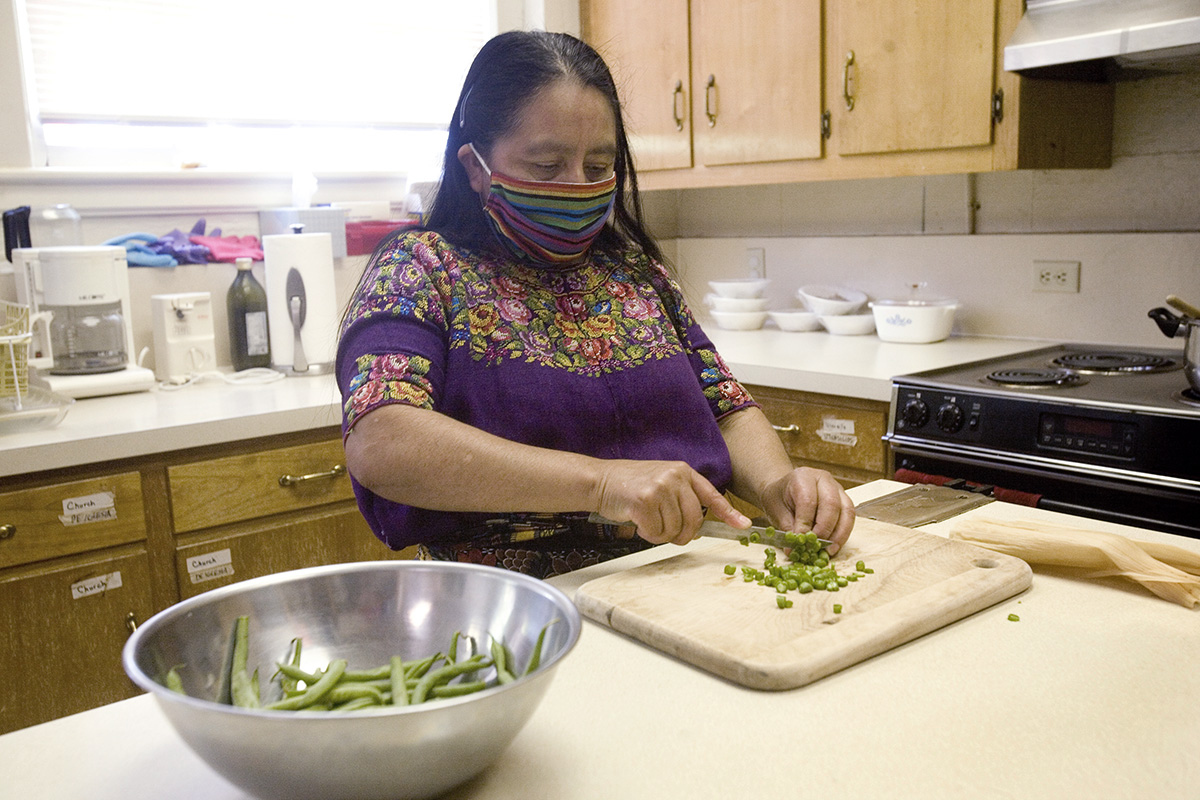For nearly three years, Maria Chavalan Sut has lived in sanctuary at Wesley Memorial United Methodist Church in Charlottesville, Virginia.
But on April 12, her confinement ended when Immigration and Customs Enforcement granted her a Stay of Removal for one year that allows her to move freely until her asylum case is heard.
She can walk down the street, go to the grocery store or sit in a park without fear of deportation.
“I can finally step out and enjoy fresh air and the wonders of nature without fear of being deported into the hands of executioners,” Chavalan Sut said.
An indigenous Mayan woman, the 46-year-old fled Guatemala in 2015 after her house was burned with her family inside in an attempt to force her from her land.
In 2018, Chavalan Sut made it to the small city of Charlottesville, nestled in the picturesque Blue Ridge Mountains. She had filed for asylum but received a notice from ICE that she would be deported after failing to attend a court appearance. She said she had never been notified of the date and time at which she was ordered to appear.
Wesley Memorial offered her sanctuary in October of that year.
Campaign to advocate for immigrants announced
“One of the biggest changes for me, when I came to the U.S., was the community into which I arrived,” said the mother of four children ages 8-23. “In Guatemala, I have no one to protect me or my children. Here, the entire church community protects me.
“Not only do I have the Wesley community, but there is also Alina (Kilpatrick), my attorney, and others. All of them struggle for me.”
United Methodist tradition resulted in Wesley Memorial United Methodist Church becoming a sanctuary for Chavalan Sut.
“Maria is no longer alone in this country. In Christ, there are no borders, there is only the kingdom,” said the Rev. Isaac Collins, pastor at Wesley when Maria arrived.
Maury Early, outreach chair at the church, said offering sanctuary is a community-wide effort.
“For the Wesley congregation, Maria has provided a way to put our faith into action,” he said. “Sanctuary has joined us with other churches and young people have stepped up.”
At least 36 people are living in sanctuary in places of worship around the U.S. and more than 1,100 houses of worship have signed up to be part of the Sanctuary Movement.
Francisca Lino entered sanctuary in August 2017 after defying a court order that required her to leave the U.S. For four years, she stayed at Adalberto United Methodist Church in Chicago.
In January after President Joe Biden’s 100-day moratorium on deportations went into effect, Lino felt safe to return to her home, according to the Chicago Tribune. However, when a federal judge’s order barred the U.S. government from enforcing the moratorium, Lino returned to sanctuary after only three days of freedom.
“We're here for Francisca and we'll keep pushing forward, step by step,” said the Rev. Jacobita Cortes, pastor of Adalberto United Methodist Church. “We have tried many approaches. Currently, U.S. Rep. Jesus ‘Chuy’ Garcia has requested that Congress begin the process which could result in Francisca receiving permanent residency.
“If that approach doesn't work,” she continued, “we'll find a new one.”
Chavlan Sut has been more fortunate. She said she has two plans for what she’ll do when she gets her legal residency and can be reunited with her children.
“I’ll hug my children,” she explained, “then, I’ll cook for them. When I’ve done those things, I’ll get a work permit and a driver’s license.”
The Stay of Removal letter protects Chavalan Sut from deportation for one year. Current U.S. policy does not mandate deportation, but it will protect her even if deportations are re-introduced.
Deportations and arrests of immigrants have fallen under the Biden administration, according to The Wall Street Journal, but immigration law remains an increasingly polarized political issue.
National Justice for Our Neighbors, a United Methodist network of legal clinics primarily funded by the United Methodist Committee on Relief and annual conferences, orients immigrants through the legal system.
“It is getting better for immigrants," according to T.J. Mills, consulting attorney for the national network. “Trump had set things back for decades. Immigrants were seen as people who came to the U.S. to collect welfare payments. Now, there is growing acceptance of immigrants in this society.
“The trend in the U.S. government's actions is becoming less prosecutory. For the immigrant, the biggest challenge is to persevere.”
Chavalan Sut continues to persevere, but worries remain.
“We live in fear,” she explained. “There are millions of us who are living in fear. The fear is that we can be removed from the U.S. With this Stay of Removal, some of the fear has been reduced for me.”
Lord is a photojournalist based in Ivy, Virginia.
News media contact: Julie Dwyer, news editor, newsdesk@umcom.org or 615-742-5469. To read more United Methodist news, subscribe to the free Daily or Weekly Digests.
Like what you're reading? Support the ministry of UM News! Your support ensures the latest denominational news, dynamic stories and informative articles will continue to connect our global community. Make a tax-deductible donation at ResourceUMC.org/GiveUMCom.




